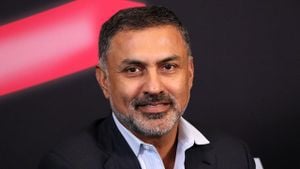Mikhail Kavelashvili has been elected as the sixth president of Georgia, making history as the first president to be chosen by the electoral college rather than direct public vote. This shift from traditional democratic practices has raised eyebrows and sparked debates about the electoral process dynamic within the country.
Following the elections on December 16, 2024, Kavelashvili, who was the nominee from the ruling party,
"Georgian Dream - Democratic Georgia," garnered 224 out of 300 electoral votes, as confirmed by Georgi Kalanderishvili, head of the Central Election Commission (CEC). This unprecedented election method, whereby 300 electors cast their votes instead of the general populace, has many questioning the legitimacy of the recent elections in Georgia.
Among the skeptics is outgoing president Salome Zourabichvili, who openly declared her refusal to accept the election results. Addressing participants of the march advocating for the rights of those detained by Georgian forces, she stated, "No one has voted for anyone," underscoring her sentiment of illegitimacy surrounding the election process. The response calls attention to the increasing polarization within Georgian society, which has been rife with protests following the government's controversial decisions.
Meanwhile, Kavelashvili's background adds another layer to the narrative. Having transitioned from professional sports to politics, Kavelashvili is noted for his football career, including prominent stints overseas. His transition to the political arena came when he became associated with the prominent "Georgian Dream" party, known for its pro-Russian stance. Despite lacking higher education qualifications—an aspect criticized heavily—he still managed to climb the political ladder, securing the presidency against the backdrop of resignations and turmoil.
Adding to the political dilemma is the fact the opposition boycotted the parliament and its election proceedings, leaving Kavelashvili as the unopposed candidate. These elections were characterized as having no alternative voices, contributing to the rising political tensions and frustrations among segments of the populace. Kavelashvili's rhetoric following his election reflects these sentiments, as he remarked, "If I respect my country, I refuse the presidency to defend the Constitution," alluding to the overarching issues between the executive and previous presidential administrations.
The incoming president also described the demonstrations and protests orchestrated by certain factions as potentially influenced from abroad, stating, "The protests are likely orchestrated by foreign agencies," indicative of concerns over external interference amid the national strife. This assertion reflects the continuing trend of blaming external forces for domestic unrest, common across various political climates.
Prime Minister Irakli Kobakhidze, who views Kavelashvili's election as historical and necessary, proclaimed, "More than seven years without patriotic leadership led to Kavelashvili’s presidency being pivotal for our country." His statement seems to point toward the linked sentiment of stability versus chaos as the populace grapples with the governance style of the newly elected leadership.
The anticipation for Kavelashvili's inauguration on December 29 has the political discourse retracing history yet again, stitching together the narratives of contention, unrest, and the ambiguous route toward political stabilization. Previously, Zourabichvili faced significant criticism for her legislative actions, continuing to face challenges left by the previous government, resulting from scandal and conflict embedded within her presidency.
Despite the immediate opposition and challenges surrounding Kavelashvili's election, many political analysts are left to ponder the future of Georgia's democracy as it navigates this new phase. The reaction from the public and the responses from various parliamentary factions will dictate whether Kavelashvili can unify the country or whether divisions will deepen under his leadership.
Looking forward, many await how Kavelashvili's presidency will impact Georgia, which recently sparked civil unrest following government decisions impacting EU integration processes and public trust. The challenges facing him will not only dictate his leadership style but also shape the political stability of the country long term, presenting serious questions about democratic progress and the power dynamics within Georgia’s ruling parties.



